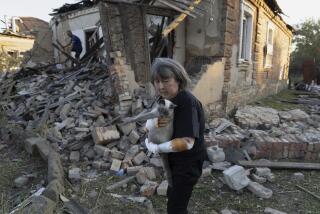Extension of Bosnia Mission Should Not Be Ruled Out
- Share via
The problem of U.S. policy in Bosnia is that there is no fix in sight. American diplomacy--and plain war weariness--stopped the shooting as winter approached in 1995. The Dayton peace accord established, nay imposed, a political map in the beleaguered country. NATO forces, 60,000 strong, a third of them Americans, sorted out and separated the opposing forces. Elections were held for a national government and nominally subservient regimes representing the country’s three ethnic factions--Muslims, Croats and Serbs.
It looked fine on paper, but the Americans, their European allies and the Bosnians themselves could see that the solution was just that--a piece of paper. In the nearly two years since Dayton, brigades of foreign advisors, technocrats and soldiers have done a commendable job of keeping the peace, disarming combatants, building governmental structures and extinguishing myriad disputes.
On Tuesday President Clinton called in congressional leaders to give them his view of what lies ahead. It isn’t the withdrawal of American troops serving with NATO in Bosnia. With the expected backing of Congress, they will stay on, the unconfirmed word was. Or at least about 5,000 of them, down from the current 8,000. How long and to what specified purpose were not clear. Shifting goals and timetables for the NATO force and civilian advisors have given us pause on the Bosnia operation from the start.
Certainly there is work to do in the war-ravaged region: Some heavy weapons remain targeted for destruction; a fair allotment of radio and TV outlets among contending political factions should be pursued; indicted war criminals, mainly the big fish like Bosnian Serb strongman Radovan Karadzic, should be isolated politically and brought to justice if possible. Roads must be repaired, jobs created, homes built for returning refugees in those towns and villages where return has been possible.
But at the end of the campaign, which some estimates say will cost $5 billion, there will remain that assertion so often posed by those who came to help: “Now these folks just have to learn to get along.” Now, after centuries of enmity.
All the soldiers, civil affairs specialists, bankers, religious leaders and foreign diplomats who have worked in postwar Bosnia know that is not going to happen any time soon. That does not mean the effort should not be made. We agree that Clinton is right to give it some more time. But he should make his goals clear to Congress if he expects support. We’re still waiting for specifics.
More to Read
Get the L.A. Times Politics newsletter
Deeply reported insights into legislation, politics and policy from Sacramento, Washington and beyond. In your inbox twice per week.
You may occasionally receive promotional content from the Los Angeles Times.








